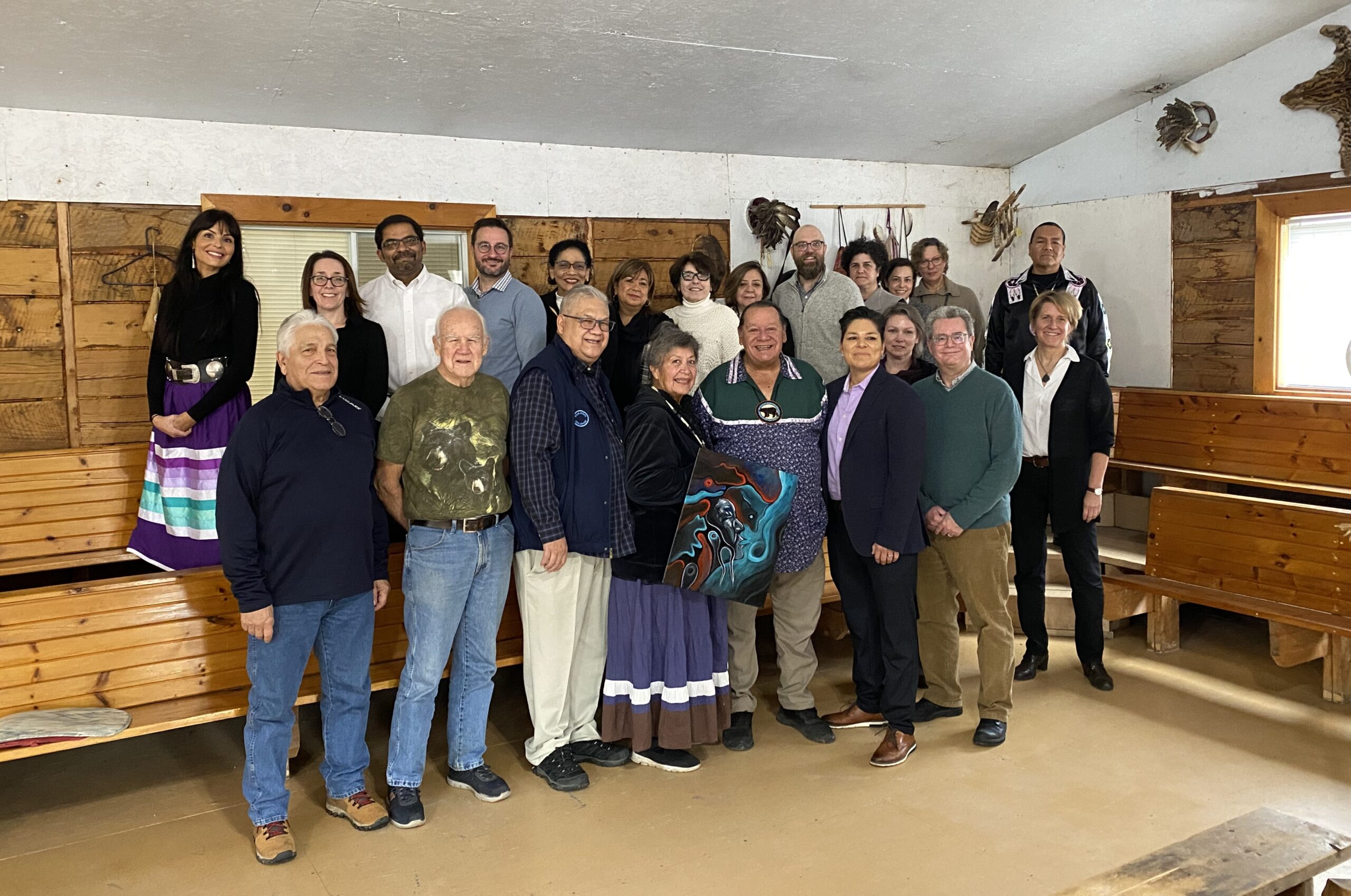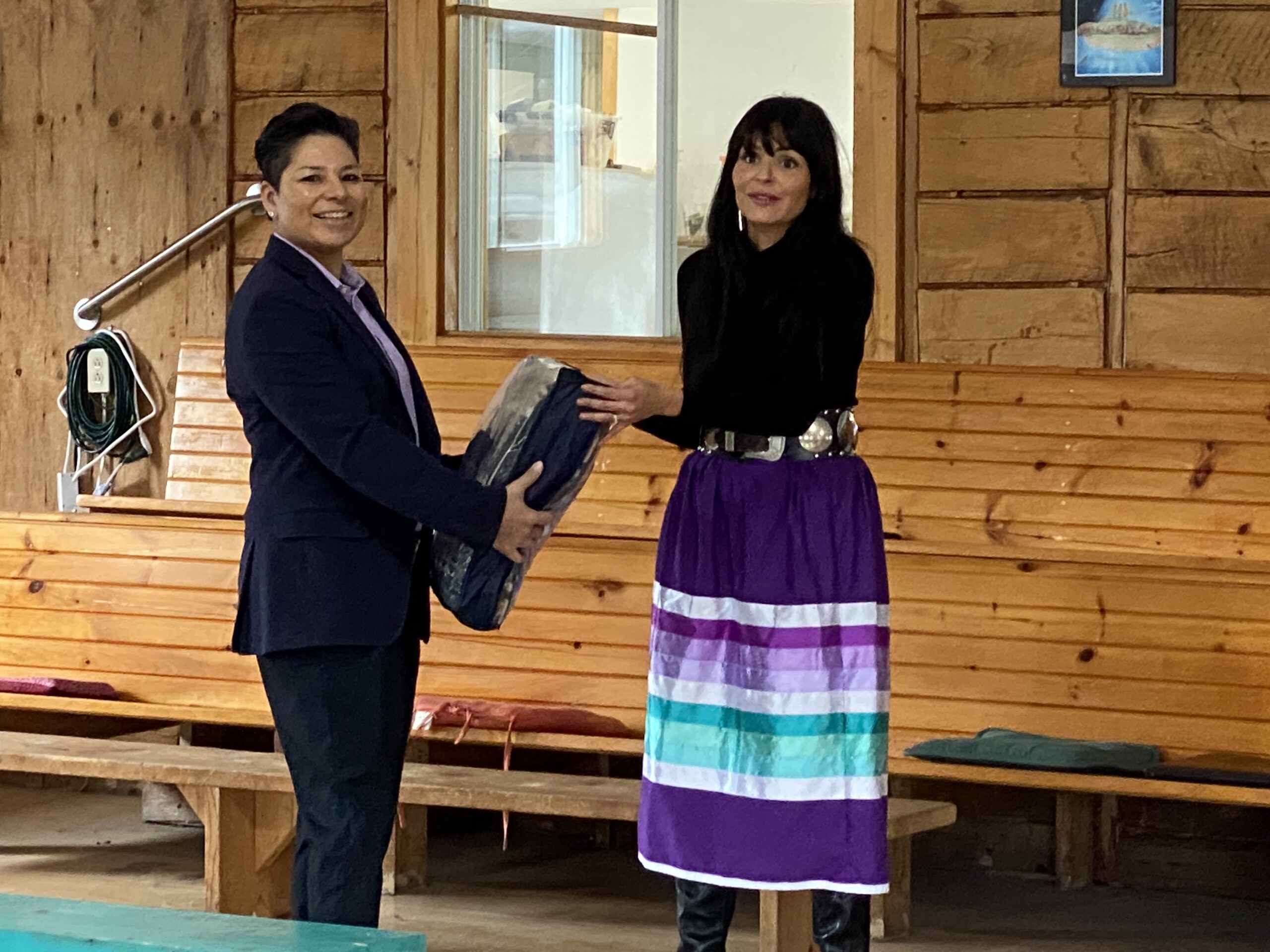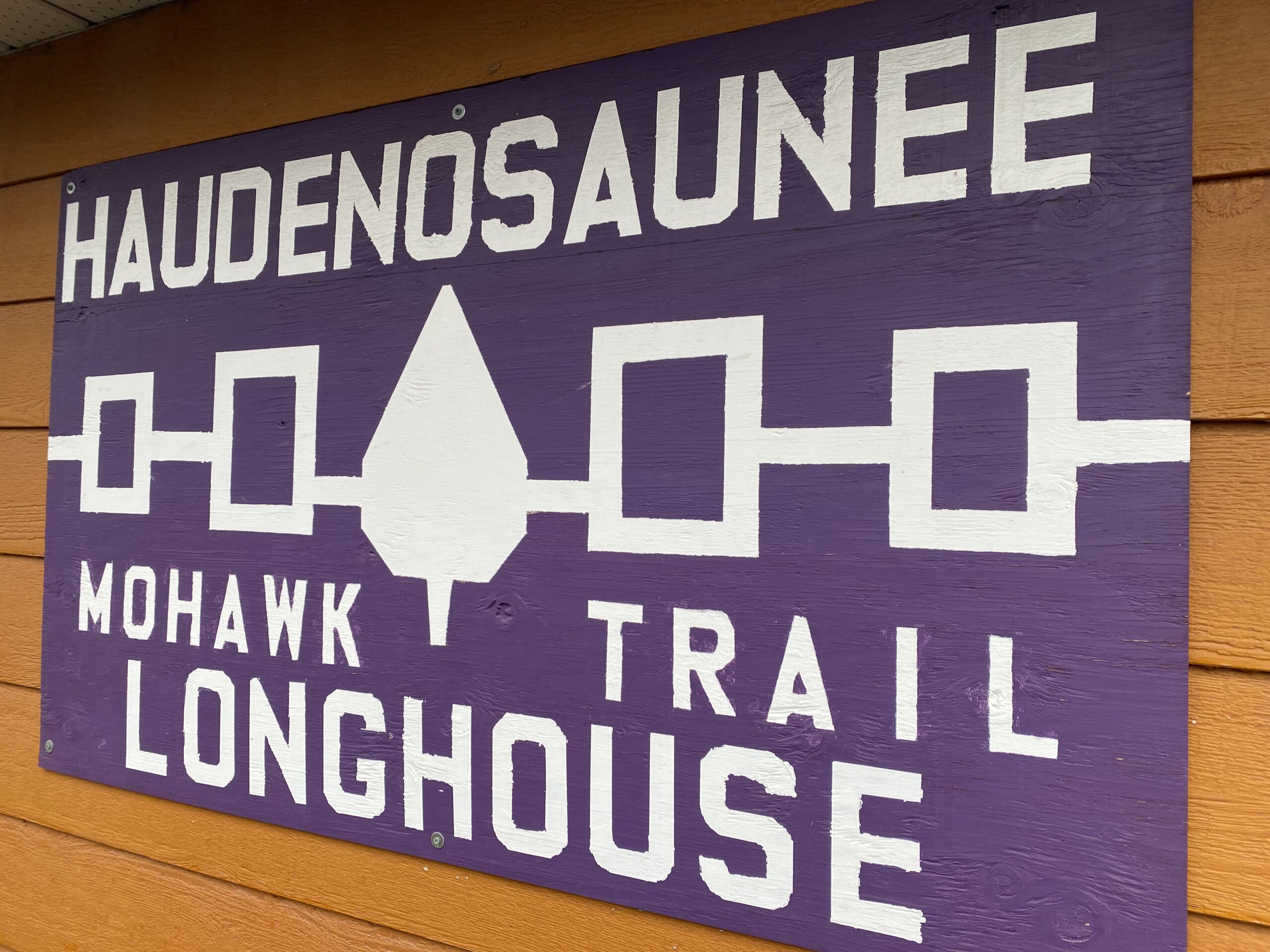
On November 22, a delegation of McGill senior academic leaders, led by Professors Chris Manfredi, Provost and Executive Vice-President (Academic); and Celeste Pedri-Spade, Associate Provost (Indigenous Initiatives), visited the Mohawk community of Kahnawà:ke to take part in a full day of work and exchange with some of the community’s political and educational leaders. The morning was chilly on this rainy fall day, but the Haudenosaunee Mohawk Trail Longhouse was already warmed by a roaring fire when they were welcomed by their hosts.
The visit was part of McGill’s commitment to respond to the Calls to Action of the Truth and Reconciliation Commission (TRC) of Canada. Ongoing engagement and collaboration with First Nations communities is fundamental to advancing McGill’s own 52 Calls to Action stemming from the 2017 Final Report of the Provost’s Task Force on Indigenous Studies and Indigenous Education.
The Final Report’s Call #39 specifically calls upon Faculties and Schools to develop comprehensive plans for how they intend to introduce and/or develop Indigenous content into their respective curricula. Being present in community and listening to leadership, cultural knowledge-holders and education professionals is an essential step in this process. It also provided McGill’s academic leadership a unique opportunity to learn about the rich history of the territory.
Commitment to collaboration
Community elders and meeting hosts Niioieren (Eileen) and Otsi’tsakèn:ra (Charlie) Patton opened the day with the Ohén:ton Karihwatéhkwen (the words that come before all else), to ground the presentations and discussions that were to follow.
Associate Provost Pedri-Spade introduced Kahnawà:ke’s Grand Chief, Kahsennenhawe Sky-Deer, the first woman to be elected to this position. After greeting the visiting scholars, she spoke of the unique journey that led her to leadership, and shared her inspiring views on a variety of topics, including the importance of restoring relations between First Nations and non-Indigenous peoples, as well as the ongoing detrimental impacts of colonialism. She reiterated her support for collaboration with McGill, commended the University’s initiative to establish an Indigenous Advisory Committee, and emphasized the vital importance of the Policy on Indigenous Membership/Citizenship that McGill is currently developing.
Community issues
Participants had the opportunity to hear a presentation on Kahnawà:ke’s history and culture by the Kahnawà:ke Mohawk scholar Taiaiake Alfred, Senior Consultant on Indigenous Initiatives at McGill, with a focus on the community’s contemporary issues, such as education capacity building, language revitalization, partnerships, nation building, self-determination and sovereignty, including economic sovereignty and self-sufficiency.

Professor Rob Spade, from the Schulich School of Music and Cultural Advisor at McGill, an Ojibwe (Sturgeon Clan) artist and educator from Fort Hope First Nation (Northern Ontario), spoke about his Clan’s journey and mission of teaching and learning. He offered a song and teachings that addressed the significance of embodying inter-Indigenous reciprocities and protocols. He touched upon Anishinaabe relations with sacred sites in the area.
The day went on with a presentation by Treena Wasonti:io Delormier, PhD, from the School of Human Nutrition, on the working relationship between McGill and Kahnawà:ke, through the lens of her own experience as a researcher at McGill, notably with the Kahnawà:ke Schools Diabetes Prevention Program (KSDPP).
Delormier offered a first-hand testimonial on the strength and resilience of the Kahnawà:ke community and discussed the many challenges related to increasing research capacity, and conducting such research respectfully through engagement and relationship building with the communities. She also spoke about the unique challenges facing traditional knowledge holders and the importance of revitalizing the Mohawk language, drawing on her own journey as a scholar and member of the community.
Challenges facing Mohawk youth
Another community elder, Joe Deom, spoke in detail about the creation, development, and struggles of the Kahnawake Survival School, which has been in operation for 45 years, despite all odds, and now counts over 200 students. At the heart of the presentation was the ability to develop appropriate curricula for Kanien’kehaka youth, particularly in terms of language teaching in the political and legal landscape of Quebec.
This theme was also discussed in the following presentation by Bethany Douglas, Post-Secondary Distance Counselor at the Kahnawà:ke Education Centre. An expert in advising and supporting First Nations students in their academic careers, Douglas outlined the challenges Mohawk youth face in achieving success, particularly in CEGEP. She offered an overview of the Centre’s transformative initiatives, and advocated the in-community teaching model in higher education, as well as the importance of developing more online programs and courses to reach out to communities.
Dismantling barriers
The day ended with an exchange on various topics, including potential research and scholarship opportunities in the fields of law, medicine, nutrition, psychology and mental health, and history, with a perspective of supporting First Nations’ key objectives. The final topic addressed was the work on building a tuition scholarship model for Haudenosaunee students attending McGill University in line with Call #13 for Truth and Reconciliation at McGill. Provost Manfredi expressed his support for this initiative.
“We have been in consultation with Haudenosaunee communities since July 2023 on how best to provide tuition funding in a way that aligns with the educational realities and needs of community members,” said the Provost. “As an institution, we are striving to dismantle, one by one, the barriers these students face in their journey to access higher education.”
Strengthened by new friendships and ideas, the McGill delegation brought back a greater appreciation of the challenges facing First Nations leadership in supporting their students’ educational goals, First Nations views of what decolonial education looks like, and what they as leaders at McGill can do to support First Nations communities, particularly our host Nation.

